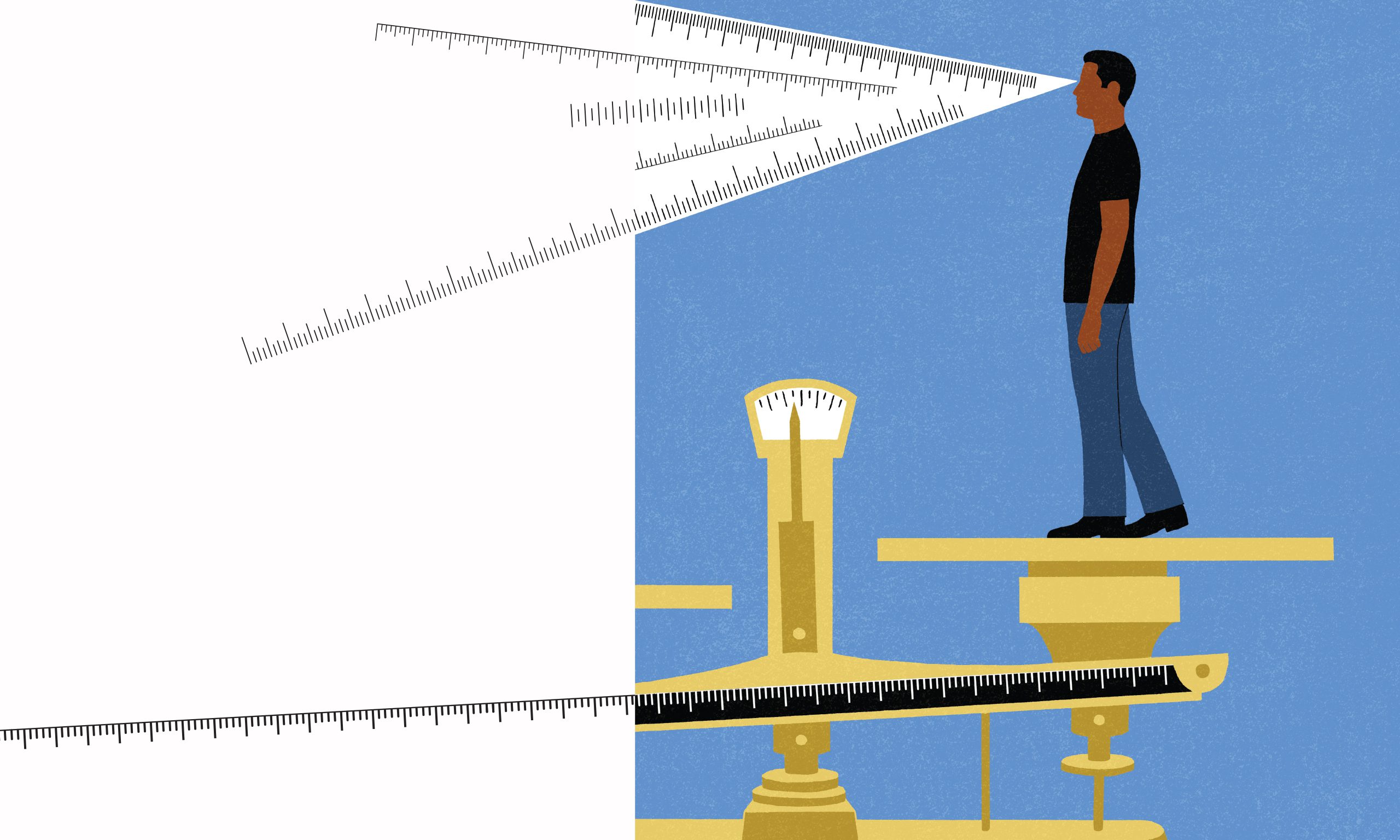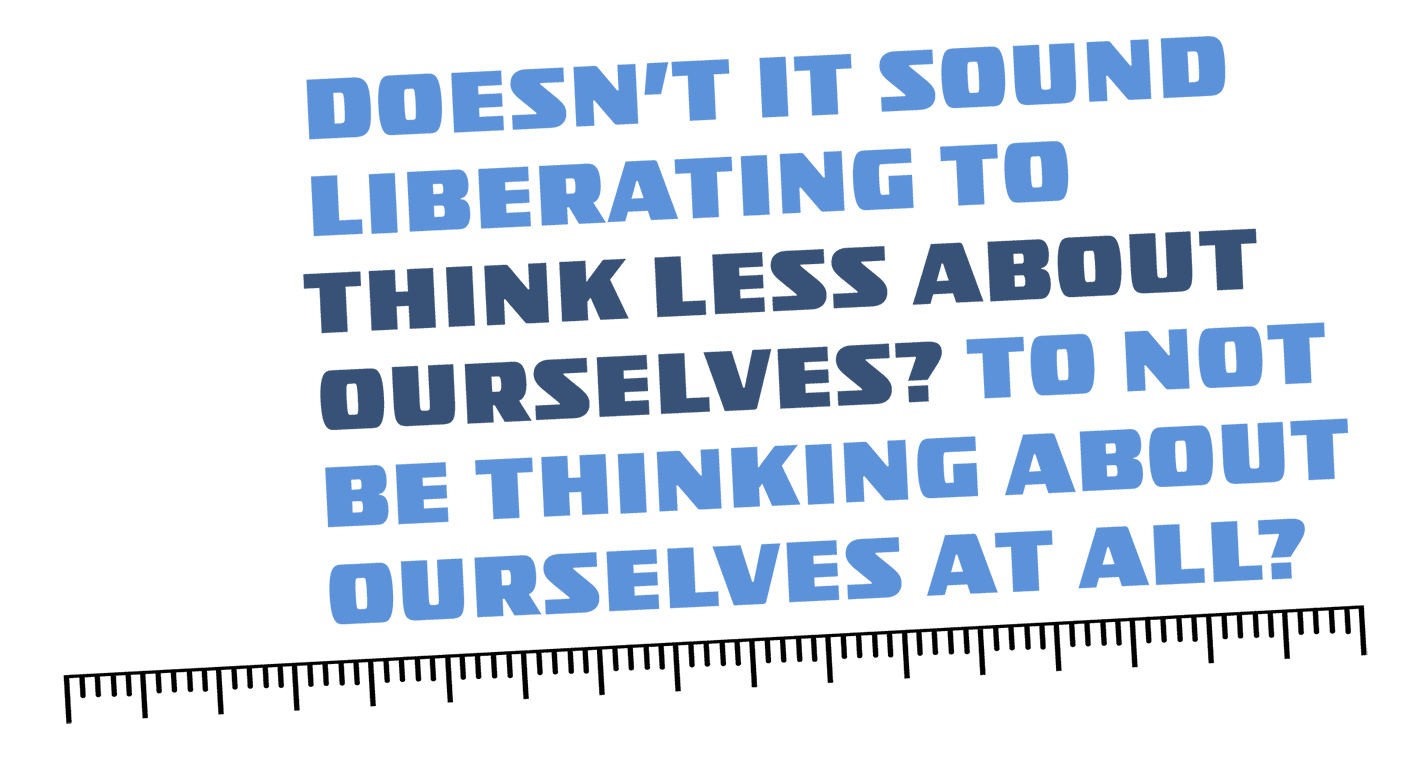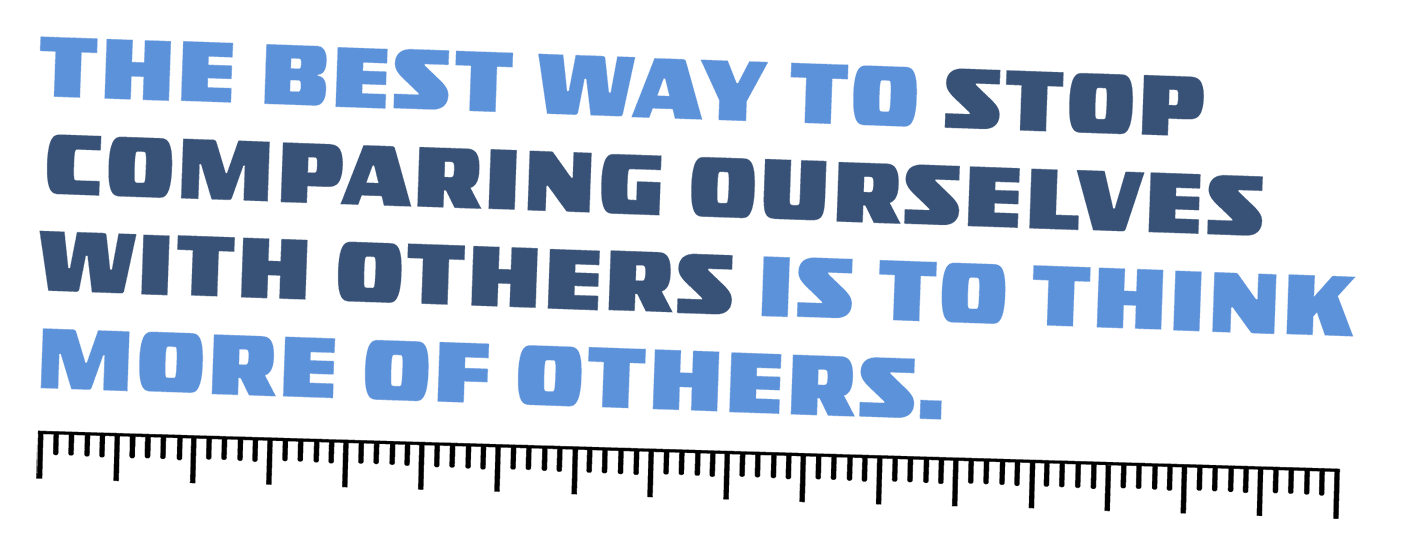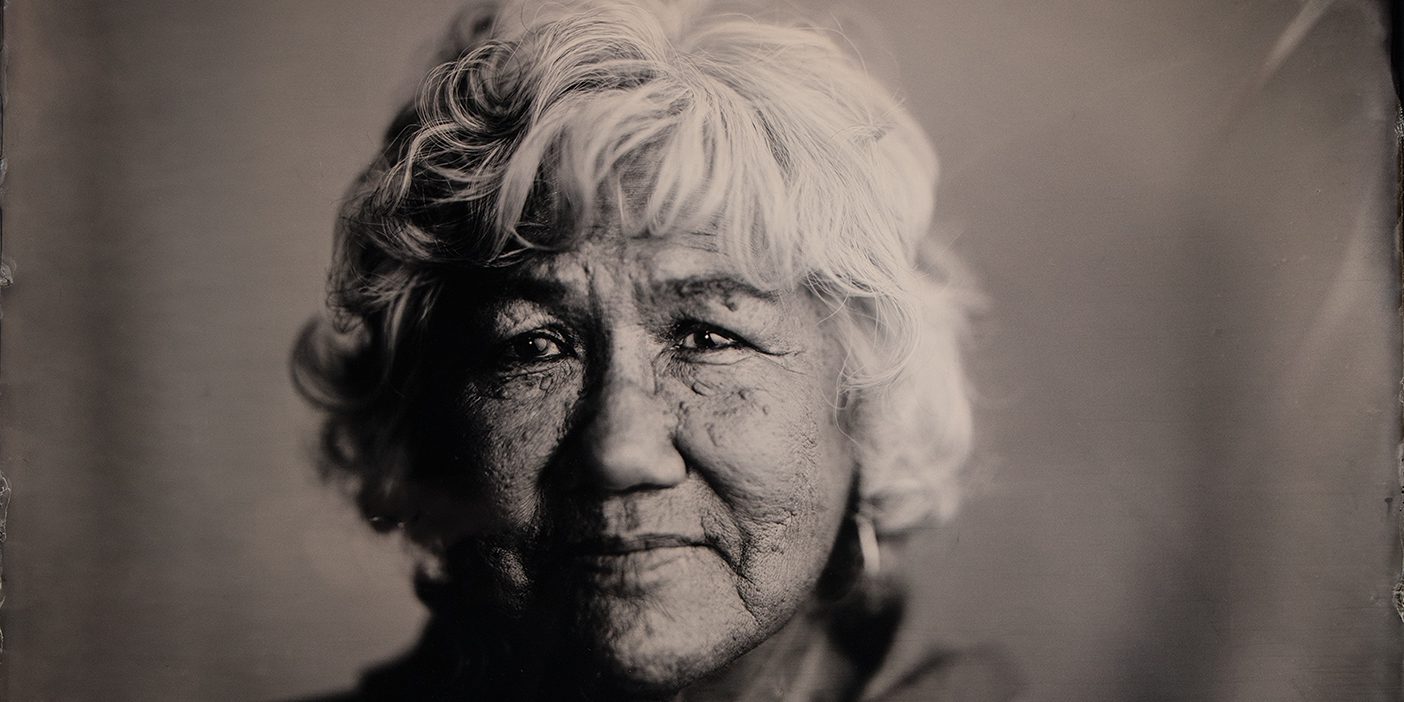Beyond Compare

Beyond Compare
When we feel inclined to compare, we should remember that the race is against sin, not each other.
By J. B. Haws (MA ’03) in the Fall 2019 Issue
Illustrations by James Steinberg
When I first received the invitation to give a devotional address, I just did not know what I would say. I thought about all of the past devotionals that have been so memorable. I just couldn’t shake the feeling of wondering if I could measure up. How would my devotional talk compare? And, in a flash of recognition, I was suddenly pulled up short. There it was. That was my topic. I needed to spend some time wrestling to the ground this vexatious tendency to compare.
As Natural as Breathing
This tendency to compare is something that I think about all the time because I do it all the time. But saying, “I do it all the time,” is like saying, “I breathe all the time.” It just happens without my thinking about it. It can almost feel reflexive—almost natural. And that is the point. That is why it is so vexatious. We know from Mosiah 3 that when we are left to our “natural” state, we struggle to “[yield] to the enticings of the Holy Spirit” (Mosiah 3:19). We are in opposition to God, at cross-purposes to His plan.
So what would the Holy Spirit entice us to do? Where can we yield on this?
First, we need to identify the problem. Let me outline it by revealing how I used to envision a scriptural narrative found in D&C 7 and John 21, with some literary license. These scriptures tell how John expressed his heartfelt wish to have “power over death, that [he could] live and bring souls unto [Christ]” until Jesus comes again (D&C 7:2). Peter, on the other hand, had desired that he might “speedily come unto [the Lord] in [His] kingdom” (D&C 7:4).
Here is how I have imagined this scenario playing out. Peter approaches the Savior a bit hesitantly and quietly asks, “What was John’s heartfelt wish?” Peter learns that John desired to stay on the earth until the Second Coming to preach the gospel. I can see Peter keeping a forced smile and saying, “Wow. That is wonderful.” But in his mind he is really thinking, “Why didn’t I ask for that? Why didn’t I even think of that? John is so much more righteous than I am, not to mention he’s a faster runner than me! Why do I always have to be so impetuous and jump in first on everything?”
In this reading, one might assume that D&C 7:5 would read like this: “I say unto thee, Peter, [your desire] was a good desire; but my beloved [John] has desired that he might do more, or a greater work yet among men than what [you have done, thou slacker].” Of course, the verse does not read that way. Here is how it really reads: “I say unto thee, Peter, this was a good desire; but my beloved has desired that he might do more, or a greater work yet among men than what he has before done” (emphasis added).

I feel this with the force of truth: our perfect, loving God makes no horizontal comparisons. In this verse Jesus compared John only with John’s former self—John with old John. He compared Peter only with old Peter. And He compares me only with old me.
Here is a more contemporary example from President Boyd K. Packer’s time as a mission president:
I needed a new assistant and had prayed much about the matter. I then called zone conferences, where I met and interviewed every missionary, always with the thought in my mind, “Is this the man?” The answer finally came: “This is the man.” He was appointed. He had been permitted to come on a mission only after some considerable shaping up to become eligible.
After the announcement one of the zone leaders came to see me privately. He came from the same community in the West as did the new assistant. He was obviously disturbed. His first question was, “Do you really know the elder you have appointed as your assistant?”
“Yes, Elder. I know all that you know about him, and a good deal more,” was my answer.
“Why, then, was he appointed your assistant?”
I pondered for a moment and then said, “Elder, why don’t you ask the question that you came to ask?”
“What do you mean?”
“Ask the question that is really on your mind,” I encouraged.
“But I did,” he said.
“No,” I said. “There is another question. The thing that is on your mind is not ‘Why did you appoint him as your assistant’; it is ‘Why did you not appoint me?’”
Now please understand. I thought his unexpressed question to be a very logical and sensible one. . . .
. . . I had sympathy for this young man and admired him greatly for his courage to speak.
“If you should ask why you were not chosen,” I said, “I would have to answer, ‘I do not know, Elder.’ I only know that he was chosen. Perhaps he may fail. But at least I know he is the one with the combination of talents and ability and qualities best calculated to get done what the office needs at the moment.
“This is no reflection upon you. You may yet preside over him and many above him. You may be his bishop or his stake president. You may preside over the Church. I do not know. But his call is no reflection upon you. Do not be injured by it.
“Go back to work and serve the Lord. Sustain him,” I counseled. “Your contest is not with him but with yourself.”¹
“Your contest is not with him but with yourself.” Or, put another way, Elder Jeffrey R. Holland (BS ’65, MA ’66) said:
[God] cheers on every runner, calling out that the race is against sin, not against each other.²
We all know this, don’t we? We feel these truths deeply. Just repeating a sentence like “Your contest is not with him; it is only with yourself” or “The race is against sin, not against each other” feels like verbal aloe vera on our sunburned souls—it soothes, it cools, we feel tense muscles relax. But if we know these truths, if they make us feel so settled, then why is it so hard to remember them?
What can we do?
The Process of Becoming Aware
For one thing, we can be mindful of our tendency to compare. Be mindful of it, think about it, and sit with it. And here are some things we notice.
We sense that comparing leads to all kinds of trouble. On the one hand, it can breed arrogance, conceit, disdain, contempt, self-satisfaction, complacency, and apathy. On the other hand, it can breed despair, hopelessness, and feelings of worthlessness and shame. Comparison can be a potent instrument for sin and misery. In 3 Nephi we read of Satan’s success in getting those Saints to be puffed up in comparisons, ranks, and distinctions. Because of this “the church began to be broken up” (3 Ne. 6:14; emphasis added).
Can’t we hear echoes of President Ezra Taft Benson’s (BS ’27) classic discourse on pride? He said, “Pride is essentially competitive in nature,”³ and quoted C. S. Lewis:
Pride gets no pleasure out of having something, only out of having more of it than the next man. . . . It is the comparison that makes you proud: the pleasure of being above the rest. Once the element of competition has gone, pride has gone.⁴
When we pay attention, we notice how false these comparisons most often are—that is, that they are often based on falsehoods and on faulty premises, both of others’ making and of our own making. That is worth noting, worth confronting, and worth constantly reminding ourselves.
Too Many Variables
The Book of Mormon anti-Christ Korihor made an assertion that does not get enough attention for just how demonstrably false it is. He declared that “every man prospered according to his genius, and that every man conquered according to his strength” (Alma 30:17). That is simply not true.
No one can legitimately say, in the ultimate sense, “I prospered because of my genius,” or, “I conquered because of my strength.” In reality, so many variables are involved. Where and when we are born, our race, our gender, the schools available to us, the education level of our parents, our genes—there are so many things that are out of our control. All of these factors impact the degree to which we even have the opportunity to “prosper” or “conquer.” There have been many geniuses who have not had equal opportunity to prosper and many strong men and women who have not had equal opportunity to conquer.
This does not mean that we simply acquiesce to biological determinism or circumstantial determinism, nor wallow in defeatism. Agency is a reality and an incomparable endowment. But can we see why comparisons just are not fair—to us or to others? There are too many variables involved.

All of this is to say that we should be more compassionate with everyone because we do not know what burdens they are carrying. And we should certainly be more humble when we succeed. Is it any wonder that King Benjamin asked, “Can ye say aught of yourselves? I answer you, Nay” (Mosiah 2:25)?
We must acknowledge that privilege is real. Prejudice is real. Injustice is real. Remember that Korihor was anti-Christ. The demonstrably false statement that we prosper according to our genius seems to be another way of denying that we need Christ. We need to be reminded that it is “by grace” we are saved. It is the gift of God, lest any of us “should boast” (Eph. 2:8–9).
We can trust that the Lord’s grace is sufficient to ultimately right every injustice, to make up for every loss, and to make weak things strong.
When we come face to face with our weakness, Ether 12:27 is a good place to turn. We are reminded that the Lord gives unto men and women “weakness that they may be humble.” Not weaknesses but weakness. Weakness. A shared, universal condition: mortality. Mortality makes us humble—again and again and again. And I might submit that this tendency to compare is part of mortality, is universal. When we are humbled by that recognition, we can trust that through the Lord’s all-sufficient grace, weak things can become strong.
Childlike Humility
In this human dilemma of comparison, Jesus is the answer: His teachings, His example, and His power to effect a change of heart—a lasting, saving change of heart—in each of us.
Let’s consider a thought or two about the teachings of Jesus Christ. I am grateful that the gospel writers were honest enough to include passages that show that Jesus’s apostles struggled, even squabbled over this (see Luke 22:24–27). When they asked, “Who is the greatest in the kingdom of heaven?” (perhaps the champion of all comparison-motivated questions), “Jesus called a little child unto him . . . and said . . . whosoever therefore shall humble himself as this little child, the same is greatest in the kingdom of heaven” (Matt. 18:1–4).
This reminds us that King Benjamin recommended that we overcome our natural-man or natural-woman state by becoming as a little child (see Mosiah 3:19).

I have four wonderful children—Parley, Marshall, Truman, and Ashley—and I have learned so many lessons from them. I remember vividly a backyard game of catch with my two oldest boys, Parley and Marshall. Parley was 5 or 6 years old; Marshall was probably 3. I would throw the football to each of them in turn. Parley was catching the football almost every time. Marshall, not so much.
I can see Marshall concentrating, watching the ball—and then missing it every time. No matter how I threw the ball, it seemed like it always hit him on the head as it went right through his hands, which were closing for the ball just one beat too early or too late. (Luckily it was a really soft, inflatable football.) But here is the thing I will never forget: Marshall cheered, jumped up and down, and squealed in delight every time Parley caught it. I can still hear his little voice yelling, “Good catch, Par!” or, “That was great, Par!” And then he would miss the next throw that came to him. But somehow that did not dampen his enthusiasm for Parley’s success. Somehow he knew that his contest was not with Parley. He could have joy in Parley’s success. How do we recapture that sense of childlike celebration for the good fortune of others?
Less About Ourselves
We recapture that sense by thinking less about ourselves. Here is how President Dieter F. Uchtdorf described what this kind of selflessness looks like:
Some suppose that humility is about beating ourselves up. Humility does not mean convincing ourselves that we are worthless, meaningless, or of little value. Nor does it mean denying or withholding the talents God has given us. We don’t discover humility by thinking less of ourselves; we discover humility by thinking less about ourselves.⁵
Doesn’t this description just fit with the image of the Son of God kneeling before weary and confused disciples and washing their feet? This is Jesus, choosing to be a guest at a publican’s house without worrying about the way that His reputation might be harmed in the eyes of murmurers. This is Jesus, immune to the criticisms of people who, if they had lived in today’s world, would be making their same sniping judgments in the comment sections of social-media posts. This is Jesus, sincerely and wholeheartedly deflecting praise and glorifying His Father.
An anecdote from former Young Women general president Sister Susan W. Tanner (BA ’84) captures this as beautifully as almost anything I have ever heard.
I remember well the insecurities I felt as a teenager with a bad case of acne. I tried to care for my skin properly. My parents helped me get medical attention. For years I even went without eating chocolate and all the greasy fast foods around which teens often socialize, but with no obvious healing consequences. It was difficult for me at that time to fully appreciate this body which was giving me so much grief. But my good mother taught me a higher law. Over and over she said to me, “You must do everything you can to make your appearance pleasing, but the minute you walk out the door, forget yourself and start concentrating on others.”⁶
That is it.
Think of all of the questions that bombard us daily: Did I get picked for a leadership position on my mission? Did I score more points than my rival in the basketball game? Did I get the highest score on the test in my class? Was I the one who landed the internship? If I glance over at the treadmill next to mine, will I find that I am running at a faster pace? And on and on and on. These constantly nipping questions are all about me, me, me. And it is exhausting.

Doesn’t it sound liberating to think less about ourselves? To not be thinking about ourselves at all? And to do that effortlessly, as naturally as breathing, because it is just who we are? So that none of this—not flattery, not worry about where we measure up, and not insecurities fueled by the lack of retweets—can possibly stick to us?
Jesus is the answer: His teachings, His example, and especially His power to effect this change in our hearts.
When we pray with all the energy of our hearts and strive to be true followers of Jesus Christ, this pure love of Christ is bestowed upon us (see Moro. 7:48). It fills us. Charity renders powerless this temptation to compare. That is because, when filled with charity that “seeketh not her own” (Moro. 7:45; 1 Cor. 13:5), we are purified even as Jesus is pure.
This is the Savior who aims to make us “equal with him” (D&C 88:107). There is no jealousy, no competition. If the temptation to compare reared its head, He “gave no heed” to it (D&C 20:22). And we can be like Him.
Give No Heed
The truth is, we are going to walk out of this room and right back into the pressure cooker. Universities, the job market, social media, even Church basketball are all set up systemically, almost intrinsically, to force comparisons upon us. But that does not mean that we have to give heed.
A few years ago, after we had read in class excerpts from President Benson’s talk on pride, competition, and comparison, a student asked, “Then how I am even supposed to play sports?” Admittedly, it is tough. But we should not shy away from these crucibles of comparison in which our character is forged and in which we can practice what we’re talking about here.
We can play sports and feel the thrill of our muscles stretching and responding as we learn new skills and put into action things we have practiced; our contest can be just with ourselves, and we can honestly celebrate the successes of others. We can play musical pieces, paint paintings, write stories, and join in the joy that these expressions of talents will bring to others.
Think of how Jesus freely used His talents and gifts to bless others. This is not about hiding under a bushel; this is about not worrying how brightly our light shines in comparison with the person right next to us. This is about having pure motives—being purified even as He is pure. After all, Jesus is the very light that we want to “hold up” (3 Ne. 18:24). And do we ever need this light! Because everyone, to some degree or another, feels these insecurities. It is so vital that we reach to lift others because everyone feels the weight of this trying to pull them down. We need people who respond to President Benson’s call to “[conquer] enmity toward our brothers and sisters, [esteem] them as ourselves, and [lift] them as high or higher than we are.”⁷
What Really Matters
This whole endeavor is rife with paradoxes, but these very tensions can be productive. The best way to remember that our contests are only with ourselves is to think less about ourselves. The best way to stop comparing ourselves with others is to think more of others. When we don’t find easy answers, it is my hope and my prayer that the Spirit will teach us of these “peaceable things of the kingdom” (D&C 36:2), even when they are hard for us to articulate.
There is no question that you and I are going to fail at many things we attempt to do, and in the eyes of those making comparisons, we all are repeatedly going to fall short. Someone else will be hired for a job, picked for the team, selected for a calling, and so on. But do not take that as a mark of your worth. Disappointments do sting, but they can also be wonderfully, albeit painfully, formative. Do not let the temptation to compare give these disappointments destructive power. When disappointments hit, take a deep breath; remember what really matters.
In a talk President David O. McKay once imagined our future interview with the Lord. The focus of that hypothetical interview was the quality of our relationships, with special attention on individuals in our immediate families. President McKay pointedly stressed that the Lord will not ask about our professions, only our integrity. He will not ask for our résumé of Church callings, only our interest in ministering to others.⁸ These are the things that really matter.
C. S. Lewis once proposed, “We might think that God wanted simply obedience to a set of rules: whereas He really wants people of a particular sort.”⁹ This includes becoming the sort of people who slough off the tendency to compare just like water off the proverbial duck’s back.

How do we evaluate how we are doing? Well, not by comparing. This is another of those paradoxes. Can’t you just hear yourself saying, “I am doing so well at this not-comparing thing. I bet I compare myself to others way less than my roommate does.”
I am also confident that President Benson would say to us, just as he did in 1989:
We must be careful, as we seek to become more and more godlike, that we do not become discouraged and lose hope. Becoming Christlike is a lifetime pursuit and very often involves growth and change that is slow, almost imperceptible. . . .
We must not lose hope. . . . The Lord is pleased with every effort, even the tiny, daily ones in which we strive to be more like Him.¹⁰
In “tiny, daily” ways, then, we practice. We purify our motives. We pray with all the energy of our hearts for the Lord to fill us with the love and grace that make our practice and our purifying efficacious—until this all feels as natural and as effortless as breathing.
Let’s all repeat, “My contest is not with anyone else; my contest is with myself. The race is against sin, not against each other.” Then we must pray with all the energy of heart to be filled with the pure love of Christ. We must refuse to let lies “interrupt [our] rejoicings” (Alma 30:22) over the truths that are deeper and more convincing than the falsehoods of comparisons. And then we must walk out the door, forget ourselves, and start concentrating on others.
J. B. Haws, BYU associate professor of Church history and doctrine, delivered a longer version of this devotional address on May 7, 2019. Find the full text of this and more than 2,000 other talks in video, audio, and print formats at speeches.byu.edu.
Send comments on this article to magazine@byu.edu.
NOTES
- Boyd K. Packer, “That All May Be Edified” (Salt Lake City: Bookcraft, 1982), pp. 51–52; emphasis in original.
- Jeffrey R. Holland, “The Other Prodigal,” Ensign, May 2002; emphasis in original.
- Ezra Taft Benson, “Beware of Pride,” Ensign, May 1989.
- C. S. Lewis, “The Great Sin,” in Mere Christianity (1952), book 3, chapter 8, paragraph 3; quoted in Benson, “Beware of Pride.”
- Dieter F. Uchtdorf, “Pride and the Priesthood,” Ensign, November 2010; emphasis in original.
- Susan W. Tanner, “The Sanctity of the Body,” Ensign, November 2005.
- Benson, “Beware of Pride.”
- David O. McKay from notes of Fred A. Baker, managing director, Church Department of Physical Facilities, as quoted in Robert D. Hales, “Understandings of the Heart,” BYU devotional, March 15, 1988.
- C. S. Lewis, “The ‘Cardinal Virtues,’” Mere Christianity, book 3, chapter 2, paragraph 11.
- Ezra Taft Benson, “A Mighty Change of Heart,” Ensign, October 1989.




